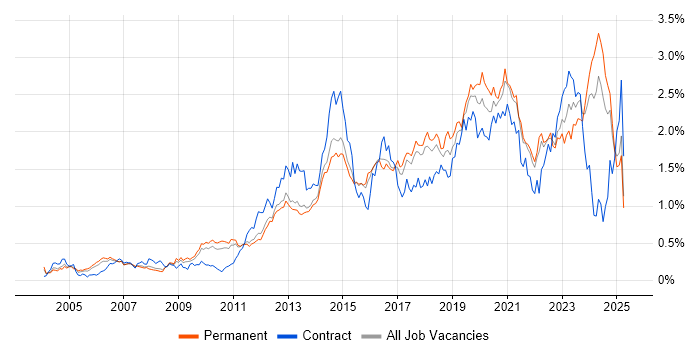Infrastructure Engineer
England > East of England
The median Infrastructure Engineer salary in the East of England is £58,910 per year, according to job vacancies posted during the 6 months leading to 29 May 2025.
The table below provides salary benchmarking and summary statistics, comparing them to the same period in the previous two years.
| 6 months to 29 May 2025 |
Same period 2024 | Same period 2023 | |
|---|---|---|---|
| Rank | 139 | 78 | 143 |
| Rank change year-on-year | -61 | +65 | +28 |
| Permanent jobs requiring an Infrastructure Engineer | 47 | 177 | 80 |
| As % of all permanent jobs advertised in the East of England | 1.43% | 2.78% | 1.60% |
| As % of the Job Titles category | 1.51% | 2.96% | 1.91% |
| Number of salaries quoted | 38 | 142 | 65 |
| 10th Percentile | £41,250 | £32,875 | £38,750 |
| 25th Percentile | £46,563 | £39,750 | £42,500 |
| Median annual salary (50th Percentile) | £58,910 | £45,000 | £50,000 |
| Median % change year-on-year | +30.91% | -10.00% | +16.96% |
| 75th Percentile | £70,000 | £57,188 | £55,000 |
| 90th Percentile | £71,500 | £67,500 | £66,300 |
| England median annual salary | £55,320 | £50,000 | £50,000 |
| % change year-on-year | +10.64% | - | - |
All Permanent IT Job Vacancies
East of England
For comparison with the information above, the following table provides summary statistics for all permanent IT job vacancies in the East of England. Most job vacancies include a discernible job title that can be normalized. As such, the figures in the second row provide an indication of the number of permanent jobs in our overall sample.
| Permanent vacancies in the East of England with a recognized job title | 3,110 | 5,988 | 4,194 |
| % of permanent jobs with a recognized job title | 94.36% | 93.97% | 83.68% |
| Number of salaries quoted | 1,486 | 4,578 | 2,140 |
| 10th Percentile | £27,500 | £25,809 | £26,250 |
| 25th Percentile | £34,500 | £31,250 | £36,330 |
| Median annual salary (50th Percentile) | £50,000 | £47,500 | £55,000 |
| Median % change year-on-year | +5.26% | -13.64% | +10.00% |
| 75th Percentile | £65,000 | £62,500 | £67,500 |
| 90th Percentile | £73,250 | £75,000 | £80,000 |
| England median annual salary | £56,000 | £52,500 | £60,800 |
| % change year-on-year | +6.67% | -13.65% | +1.33% |
Infrastructure Engineer
Job Vacancy Trend in the East of England
Job postings that featured Infrastructure Engineer in the job title as a proportion of all IT jobs advertised in the East of England.

Infrastructure Engineer
Salary Trend in the East of England
3-month moving average salary quoted in jobs citing Infrastructure Engineer in the East of England.
Infrastructure Engineer
Salary Histogram in the East of England
Salary distribution for jobs citing Infrastructure Engineer in the East of England over the 6 months to 29 May 2025.
Infrastructure Engineer
Job Locations in the East of England
The table below looks at the demand and provides a guide to the median salaries quoted in IT jobs citing Infrastructure Engineer within the East of England region over the 6 months to 29 May 2025. The 'Rank Change' column provides an indication of the change in demand within each location based on the same 6 month period last year.
| Location | Rank Change on Same Period Last Year |
Matching Permanent IT Job Ads |
Median Salary Past 6 Months |
Median Salary % Change on Same Period Last Year |
Live Jobs |
|---|---|---|---|---|---|
| Hertfordshire | -6 | 19 | £70,000 | +55.56% | 41 |
| Cambridgeshire | -7 | 10 | £47,500 | +11.76% | 21 |
| Bedfordshire | 0 | 9 | £64,000 | +2.40% | 8 |
| Essex | +8 | 8 | £47,500 | -13.64% | 11 |
| Suffolk | -31 | 1 | £67,500 | +58.82% | 6 |
| Infrastructure Engineer England |
|||||
Infrastructure Engineer Skill Set
Top 30 Co-occurring Skills and Capabilities in the East of England
For the 6 months to 29 May 2025, Infrastructure Engineer job roles required the following skills and capabilities in order of popularity. The figures indicate the absolute number co-occurrences and as a proportion of all permanent job ads across the East of England region featuring Infrastructure Engineer in the job title.
|
|
Infrastructure Engineer Skill Set
Co-occurring Skills and Capabilities in the East of England by Category
The follow tables expand on the table above by listing co-occurrences grouped by category. The same employment type, locality and period is covered with up to 20 co-occurrences shown in each of the following categories:
|
|
|||||||||||||||||||||||||||||||||||||||||||||||||||||||||||||||||||||||||||||||||||||||||||||||||||||||||||||||||||||
|
|
|||||||||||||||||||||||||||||||||||||||||||||||||||||||||||||||||||||||||||||||||||||||||||||||||||||||||||||||||||||
|
|
|||||||||||||||||||||||||||||||||||||||||||||||||||||||||||||||||||||||||||||||||||||||||||||||||||||||||||||||||||||
|
|
|||||||||||||||||||||||||||||||||||||||||||||||||||||||||||||||||||||||||||||||||||||||||||||||||||||||||||||||||||||
|
|
|||||||||||||||||||||||||||||||||||||||||||||||||||||||||||||||||||||||||||||||||||||||||||||||||||||||||||||||||||||
|
|
|||||||||||||||||||||||||||||||||||||||||||||||||||||||||||||||||||||||||||||||||||||||||||||||||||||||||||||||||||||
|
|
|||||||||||||||||||||||||||||||||||||||||||||||||||||||||||||||||||||||||||||||||||||||||||||||||||||||||||||||||||||
|
|
|||||||||||||||||||||||||||||||||||||||||||||||||||||||||||||||||||||||||||||||||||||||||||||||||||||||||||||||||||||
|
|
|||||||||||||||||||||||||||||||||||||||||||||||||||||||||||||||||||||||||||||||||||||||||||||||||||||||||||||||||||||
